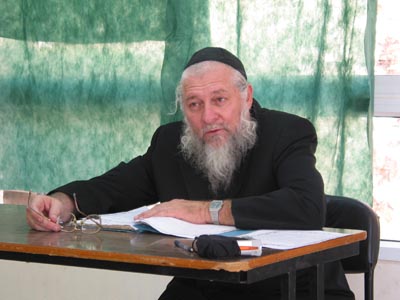 Rav Zev Leff, Shlita, On Making Aliyah
Rav Zev Leff, Shlita, On Making Aliyah

The Mitzvah of Living in Eretz Yisrael
By: Rabbi Zev Leff
Is there a mitzvah to live in Eretz Yisrael? This question has long been disputed by the greatest halachic authorities.
The Ramban says that it is a mitzvah to conquer and settle Eretz Yisrael, and it applies in all generations. The Sefer HaCharedim, similarly, counts it as a mitzvah d'oraisa that applies at all times.
On the other hand, Tosafos in Kesubos (110b) cites the opinion of Rabbi Chaim Cohen that because travel to Israel was very difficult and dangerous - those who did so were prey to illness, piracy and shipwreck - the mitzvah does not apply. Beyond that, there are many mitzvos hataluios b'aretz that are difficult to keep, And therefore nullify the mitzvah to live in Israel.
Today, there are few pirates, it's not so difficult to get here, and the mitzvos hataluios b'aretz are getting easier and easier to keep. Beyond that, there are rishonim, notably the Maharit, who maintain that the opinion attributed to Rav Chaim Cohen was mistakenly inserted in the Tosafos by a student. The Maharit says that he never heard of such a thing---that because a mitzvah is difficult to keep, therefore it doesn't apply. He says that the opinion of Rav Chaim Cohen never existed. Others, however, uphold the validity of the Rav Chaim Cohen opinion.
The Rambam doesn't mention this mitzvah specifically, and there is a great deal of discussion about his omission. Some say he left it out because living here is more than a single, specific mitzvah; it is the foundation of all mitzvos. All mitzvos depend on Eretz Yisrael. You can't observe Taryag mitzvos without being here.
However, it's very difficult to say such a thing because the Rambam includes the mitzvah of emunah in Taryag, and certainly emunah is a basis for all mitzvos. If the Rambam counts that, and certainly yishuv ha'aretz is no more of a foundation concept than emunah, it should also be counted. There are those, therefore, that say that the Rambam's opinion is that there is no mitzvah from the Torah today to settle Eretz Yisrael. It existed in the time of Yehoshua, and ceased when we went into golus, and will come back when Moshiach will come. There are those who maintain, however, the Rambam would agree that settling Eretz Yisrael is a mitzvah of rabbinical origin.
The Chazon Ish, the Gerrer Rebbe, Avnei Nezer and the Pischei Tshuvah in Shulchan Aruch agree with the Ramban and the Chareidim that there is an obligatory mitzvah from the Torah today. Theirs is the majority view of the latter-day poskim.
Rabbi Moshe Feinstein ruled that it is a mitzvah today, but only of a voluntary, not obligatory nature. He compared yishuv ha'aretz to tzitzis, which is also a voluntary mitzvah. (One doesn't have to wear a four cornered garment, but if one chooses to, he needs tzitzis.) But how would we look at a person who doesn't wear tzitzis because it's only a voluntary mitzvah? Obviously, such a person is not a yirei shamayim. He's not a person who's looking for opportunities to do mitzvos. The gemora says that in a time of anger one is punished for avoiding a voluntary mitzvah.
But even if there is a doubt about the mitzvah does that mean it should be dismissed? How much money is spent, how much time is spent on acquiring a kosher mezuzah, written with every hiddur, in careful fulfillment of all the shitos? In normal everyday mitzvos, we take care to be mehadrin min hamehadrin, to be yotzei all the shitos, to take all the halachic opinions into consideration. Yet, we don't find the same attitude when it comes to yishuv ha'aretz. There are people who build their sukkos using only wooden pegs, just to fulfill the shita of the Chazon Ish, which nobody else holds like. The same Chazon Ish says it's a mitzvah to live in Eretz Yisrael.
There are, of course, factors that may exempt a person from yishuv ha'aretz . One factor is parnassah. Will you be in a situation of financial crunch, in which you will not be able to survive? Secondly, will you be able to survive religiously? Will your Torah stature be enhanced or diminished by living in Eretz Yisrael? Thirdly, safety. Are you placing yourself in danger?
Before continuing, it is important to note that these criteria are relevant only to those living outside the Land. Once you're living here, you can never leave permanently, even for parnassah, Torah study, shidduchim, or other valid reasons. The heteirim are at most temporary. One must always have in mind to return.
There is no doubt that living in Eretz Yisrael is something that involves a tremendous amount of expense and hardship. Accordingly, there are three factors that may exempt one from the mitzvah of yishuv ha'aretz: finances, safety, and one's level of spirituality.
Will you be able to survive in Eretz Yisrael financially? If you can survive without begging, that's called making a parnasah.
What is the standard of living that the Shulchan Aruch has in mind that would exempt a person from a mitzvah in which he is otherwise obligated? Is it a question of owning one car instead of two? Or dwelling in five rooms instead of twenty? Will you be able to afford only one maid instead of two, or maybe no maids at all? A person who is used to a certain standard of living, who would have to sacrifice that standard in order to live in Eretz Yisrael, might indeed be exempt from the mitzvah.
But the question is: How proper is it to maintain a life style that prevents you from keeping mitzvos? Is that the kind of life that HaShem wants of a person? So it depends on how we define making a living. Baruch HaShem, there are people living here who are eating, who are functioning, wearing clothing, and are making ends meet without going around begging. Or if not, at least they're close to making ends meet. And if they're not close, someday it'll get close.
But I'll tell you a secret - there are also people in America who don't make ends meet. It all comes from HaShem.
The same Ribono shel Olam who can give you a parnasah in Eretz Yisrael can take away the parnasah in America. I know people in America who, by American standards, aren't making a living. Maybe they should move here.
Safety: I find it very amusing. I live on a moshav in what the newspapers call "The West Bank." I don't lock my door at night. True, the moshav is surrounded by a barbed wire fence, and we have guards all the time. But, Baruch HaShem, even after the intifada, the problems have been very minimal. At least I know when I walk out, what my enemy looks like. And I know that the people in the street with the guns are on my side.
But in Boro Park, I'm not sure that the people in the street with the guns are on my side. When I visit the States, a day doesn't go by without somebody being mugged. I find it extremely amusing to hear someone asking me, "Don't you feel unsafe living on the West Bank?" - as they lock the six locks on their door. One has to face the fact that it's not safe in America, either. And in Eretz Yisrael one has a very good protection policy, Hinei, lo yanum v'lo yashen, Shomer Yisrael. HaShem has a special connection with Eretz Yisrael.
Will living in Eretz Yisrael enhance my mitzvah observance? In Miami - at a time when we had neither a mikveh nor a yeshiva in the community - a baal habayis came to me in all seriousness, and said, "Rabbi, there is only one thing missing in our community, that if we would have it, it would make it a top-notch Torah community." I was anxiously waiting for him to suggest that we build a mikveh, and I was going to make him the chairman of the committee. What was missing? He told me that what we were missing was "an elegant, glatt kosher French restaurant!" Now, I have nothing against French food. I love French fries. But that would make it a top-notch Torah community? In all my years in yeshiva, there was never a course given in French pastry making. There's something not right with such an attitude. The places of Torah in chutz l'aretz are just an extension of the Torah of Eretz Yisrael. They are meant for people who want kedusha, but cannot go to live in Eretz Yisrael. For such people, for all practical purposes they are in Eretz Yisrael. (Whereas someone who has his feet in Eretz Yisrael, but his mind is in chutz l'aretz, is in chutz l'aretz.)
It's said that someone who learns the parshayos of korbanos, it's as if he brought a korban. But that's only for someone who cannot bring a korban, because there is no Beis HaMikdash; someone who can bring a korban in the Beis HaMikdash and learns the parasha instead, isn't fulfilling anything. If you can be here and choose not to, just wanting doesn't help.




2 Comments:
"...the Rambam includes the mitzvah of emunah in Taryag, and certainly emunah is a basis for all mitzvos."
Actually the Ramban does not have a mitvah of "Emunah" (faith). The Mitzvah is "Leida" (to know). This you can see from the Laws of Foundations of Torah 1:1). In his Sefer HaMitzvot, the word "emunah" appears in the Ibn Tibbon transaltion, but Rabbi Yosef Kapah in his transaltions of the Rambam's works explains ofver and over that the word in Arabic should be translated "to know" and not "to believe".
This essay from Rav Leff looks similar to the one that appears in the introduction to a wonderful book called "To Dwell in the Palace" by Tzivia Erlich-Klein (published by Feldheim in the 1980s). Rav Leff's essay, entitled "Where is the Religious Aliya from the West" (which is quite a bit more detailed than the essay posted here), remains one of the most significant foundations of my belief regarding the obligation of every Torah Jew to REALLY seriously consider aliyah.
The full text of "Where is the Religious Aliya from the West" can be found here:
http://www.beyondbt.com/?page_id=141
Post a Comment
<< Home